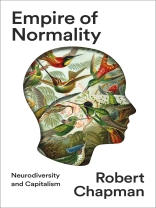‘Groundbreaking … [provides] a deep history of the invention of the “normal” mind as one of the most damaging and oppressive tools of capitalism. To read it is to see the world more clearly’ Steve Silberman, author of Neuro Tribes
‘Argues that a radical politics of neurodiversity is necessary, not only for neurodivergent folk, but for our collective liberation’ Professor Hel Spandler, editor, Asylum magazine
‘A vital book that kindles the flames of a neurodivergent revolution’ Beatrice Adler-Bolton, co-author of Health Communism
Neurodiversity is on the rise. Awareness and diagnoses have exploded in recent years, but we are still missing a wider understanding of how we got here and why. Beyond simplistic narratives of normativity and difference, this groundbreaking book exposes the very myth of the ‘normal’ brain as a product of intensified capitalism.
Exploring the rich histories of the neurodiversity and disability movements, Robert Chapman shows how the rise of capitalism created an ‘empire of normality’ that transformed our understanding of the body into that of a productivity machine. Neurodivergent liberation is possible – but only by challenging the deepest logics of capitalism. Empire of Normality is an essential guide to understanding the systems that shape our bodies, minds and deepest selves – and how we can undo them.
Robert Chapman is a neurodivergent philosopher who has taught at King’s College London and Bristol University. They are currently Assistant Professor in Critical Neurodiversity Studies at Durham University. They blog at Psychology Today and at Critical Neurodiversity.
Table of Content
Introduction
1. Capitalism and the Emergence of Normality
2. The Pathology Paradigm and Eugenics
3. The Myths of Anti-Psychiatry
4. Post-Fordism as Mass Disabling Event
5. The Neurodiversity Movement
6. Disablement without Normality
7. Towards a Democratic Theory of Mental Illness
Conclusion: Signposts towards a Way Out
About the author
Robert Chapman is a neurodivergent philosopher, writing on neurodiversity theory, madness and disability. They have taught at King’s College London, the University of Bristol, Sheffield Hallam and Durham University where they are currently an Assistant Professor in Critical Neurodiversity Studies. They blog at Psychology Today and at Critical Neurodiversity.












